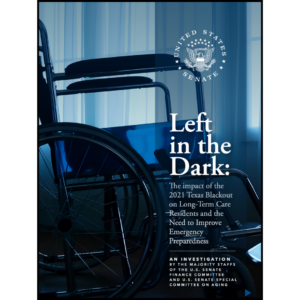How Holiday Retirement is bracing for Hurricane Irma
[Update: As of Sept. 12, Holiday Retirement sustained minor damage from Hurricane Irma. Five communities were evacuated in Florida, Georgia and South Carolina. Several communities lost power. Some have had power restored while others are waiting and using backup generators in the meantime.]
As Hurricane Irma moves over the Caribbean and heads for South Florida Friday, Mark Prince, senior vice president of operations for Holiday Retirement tells Senior Editor Nicole Stempak how the senior living provider is preparing its communities in Florida, Georgia and Tennessee to weather the storm safely. The nation’s second largest independent senior living provider has more than 4,500 residents in about 80 communities in Irma’s potential path. Prince shares how communities have prepared to shelter in place and discusses the lessons learned from Hurricane Harvey, Andrew, Katrina and others over the years.
Stempak: What is Holiday doing to prepare?
Prince: Right now, we are following The Weather Channel. At this particular point, and this is a very fluid situation, but it seems like right now it’s just going to be because of the storm, we’re going to shelter in place rather than evacuating. We did get a mandatory evacuation, only in one of our communities right now in Savannah, Georgia, so we’re moving those residents to a community in Augusta, Georgia. We are able to accommodate the residents who did not decide to go with their family members, so we are moving those folks tomorrow morning. In every place else, we are just preparing to shelter in place and to have plenty of food–at least seven days–on hand and ample bottles of water. We have generators in each community in case of power outages, which I really believe will be our biggest challenge. I could be 100 percent wrong. I hope I am, but I really believe that when the sun sets on Monday our biggest concern will be power outages and getting power restored from the local utilities and until then keeping our generators running and our residents as safe comfortable as possible along with our associates. Obviously, our No. 1 concern is for the safety of our residents and associates for our community.
Stempak: Are you adjusting company policies and procedures on a case-by-case basis with each community?
Prince: We’ve dealt with hurricanes many times in the past. Obviously, Irma seems to be a bit stronger than the others, but we have a very strict protocol on how we’re dealing with things. We started at the beginning of this week doing two conference calls a day with our executive directors and general managers. We feel that communication is the key and that they know exactly what we’re doing. We can help them if they’re going to be evacuated with buses, with additional food orders, with getting the water supplies that they need, to make sure that all the hurricane kits were put together and are in place, (and get) batteries. We talk about things like clearing the communities of as much debris as possible in case the hurricane force winds begin to have objects flying that we can minimize any risk or damage. We want to allow our general managers and exectuvie directors to run their community, and they have the autonomy to do so.
What we really try to do from our point as a company is to lend them all the tools and supplies, advice and guidance they may need to make that as comfortable and as safe as possible for our residents and the associates.
Stempak: Have there been any instances where the facilities or corporate have decided to evacuate even if it wasn’t mandatory, perhaps if there is potential for flooding at a facility?
Prince: We don’t try to second guess. I believe in today’s world that the municipalities and the state government are so well equipped and understand this. As of two days ago, the state of Florida was giving evacuation orders in low-lying areas. We’ll follow and heed that advice. We haven’t really tried to outsmart or outguess municipalities, particularly with something at the magnitude of this storm and not knowing where it’s going to hit.
Moving an entire resident base out of a community and putting them in temporary quarters and packing, that’s a really really stressful time, so we really try to be as smart in our decision-making as possible. We have found that the local authorities are smart and understand it. We really don’t want to try to second guess or upset the resident base unless we believe the local authorities are telling us they’re in harm’s way.
Stempak: You’ve mentioned past hurricanes. Have your facilities ever been hit?
Prince: We learn more and more every time. We try to take copious notes on what we’ve learned from each hurricane. We just dealt with Hurricane Harvey last week in south Texas where we had one community evacuated and we had three others in Houston. Fortunately, we did not have any flooding, but we had power outages. We’ve learned from each one of these. We really found that communication is the key not only at the community level between the general manager or executive director with the residents, family members and their associates. We try to emulate and do the same thing as a company through our regionals and home office to the folks out in the field.
Stempak: How are you communicating with families?
Prince: At the community level, one thing we’re doing folks to do is to charge their cell phones. We’re also going to try to have some Skype or FaceTime stations so folks can see their loved one, which is soothing. It helps when they can not only talk to them but see them.
On a global basis, the (community finder on our) website is where we direct people. If you go to (a specific community's) website, it will have a message on its homepage. As things arise, we update them, but we do have a communications team that updates twice daily. We’re all working around the clock now until the storm passes through and everyone is out of harm’s way, we’re all working diligently around the clock.
Stempak: You’re going to have chefs, maintenance workers, housekeepers and other staffers on site until the storm subsides. Are you housing them in empty rooms, or how are you accommodating them?
Prince: We want to try to, if all possible, maintain normal operations in the community. In these instances, we allow our staff and their family members to move into the community if we have the space for them. Or we try to make space. We’ve been quite successful at doing this the last three or four hurricanes we’ve had. They feel safe there as well. We allow our staff members to stay in the community and shelter with us.
Stempak: Are pets are allowed, too?
Prince: Absolutely. Pets are such an important part of our family. We’ve actually worked on evacuations plans to make sure we can allow residents to take their dogs and other animals.
Stempak: Are there any additional or specific needs for residents in those communities, such as oxygen tanks for ventilators, that you are planning for?
Prince: Out of the communities we’re talking about, 20 of those are assisted living and memory care units, so we have taken the precautionary measures to make sure that we have ordered at least seven days of medication. The generators can power any equipment that’s needed for those residents. We have extra emergency kits in place for our medical staff. We feel that we’ve taken precautionary measures in case of emergency so we can help those folks in our assisted living communities. The other 60 communities are independent living communities. Some of those do have some caregivers there. We have allowed caregivers to stay in the community as long as they want.
Stempak: Do you have anything printed out for the residents listing emergency contacts, medications instructions or other important information?
Prince: If we move or evacuate residents, we take the resident files with us. All of our residents also have a GreatCall device. It’s a two-way communication pendant that in case of an emergency, the resident has the pendant on their person. It’s cell phone driven, so regardless if they’re in our building or not, it works. They have emergency contacts and medication information, so not only do we keep that at the community, GreatCall has that as well.
Stempak: How do you encourage residents to prepare?
Prince: We have always given residents a list of things to have and try to supply that as well, as much as we possibly can. We want residents to have batteries. The GreatCall device is like a cell phone, so we tell them to get a good charge on that.
Stempak: What advice do you have for readers who could be affected by Irma and others who are watching the event unfold?
Prince: I think what the Governor of Florida said early on, and what I continue to tell my people is, ‘Prepare for the worst and hope for the best.’ So preparation and thinking ahead about what could happen and having the best laid plans as possible knowing you can’t plan for every single thing. You try to plan for the big things: What happens when the power goes out? Do you have enough food to feed people? Do you have a safe shelter? All of the simple necessities of life, we try to make sure we have and a good overall attitude. Reassuring folks we’re going to be OK. That we try to make the experience as palatable and truthfully, once it goes through, we try to make it as fun as possible. We’ve doubled up on our enrichment activities and what we do to gather our residents in public spaces. Without electricity, you’re going to have to depend on doing some things differently than having televisions on and people watching movies. We’ve asked our teams to try and think more about how we gather as a group and play music, games and read more than normal.

Nicole was Senior Editor at I Advance Senior Care and Long Term Living Magazine 2015-2017. She has a Journalism degree from Kent State University and is finalizing a master’s degree in Information Architecture and Management. She has extensive studies in the digital user experience and in branding online media. She has worked as an editor and writer for various B2B publications, including Business Finance.
Related Articles
Topics: Articles , Clinical , Disaster Preparedness , Executive Leadership , Facility management , Operations , Risk Management











